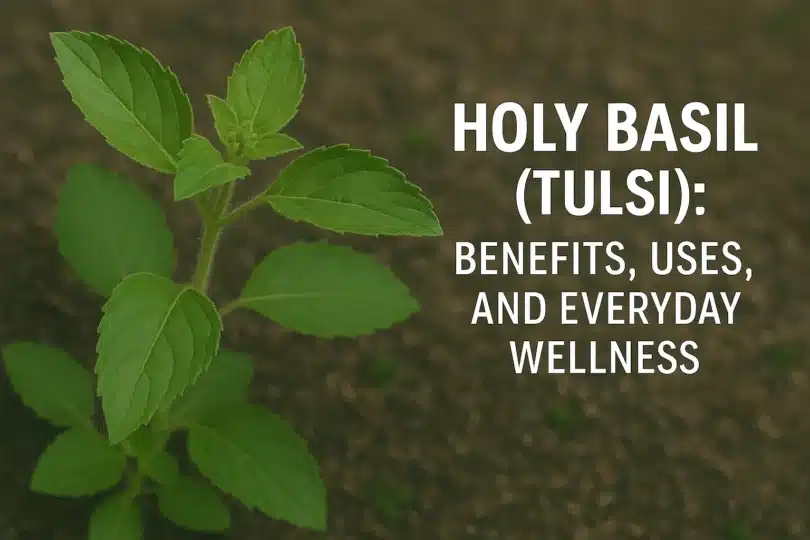Holy Basil, known in Sanskrit as Tulsi (Ocimum sanctum or Ocimum tenuiflorum), is one of the most sacred plants in Ayurveda. Called the “Incomparable One,” Tulsi has been used for thousands of years in India as both a spiritual and medicinal herb. In Hindu tradition, it is revered as a goddess in plant form and often cultivated in homes and temples. Beyond its spiritual roots, Tulsi has become a cornerstone of modern wellness for its adaptogenic properties, helping the body cope with stress, support immunity, and restore balance. With growing interest in natural stress relief and holistic approaches to health, Holy Basil has transitioned from sacred gardens into teas, supplements, and wellness blends worldwide.
Key Health Benefits
Stress Relief and Emotional Balance
Holy Basil is best known as an adaptogen—an herb that helps the body adapt to physical, emotional, and environmental stress. Compounds like eugenol, ursolic acid, and rosmarinic acid interact with the body’s stress pathways, promoting calm without sedation. Studies suggest Tulsi can reduce feelings of anxiety and improve overall emotional resilience. Many users describe a grounded calmness and steadier mood when incorporating Tulsi tea or capsules into daily life. Its role in reducing the effects of chronic stress makes it especially valuable in today’s fast-paced environment.
Immune Support
Traditionally, Tulsi was used to prevent and manage respiratory infections. Modern research supports its antimicrobial and anti-inflammatory activity. Tulsi may enhance immune cell function while calming excessive inflammation, a dual action that helps the body stay resilient without overstimulation. Its essential oils are rich in compounds that support respiratory health, making Tulsi teas a popular choice during cold and flu season. It is often paired with honey, ginger, or turmeric for a soothing, immune-supportive tonic.
Respiratory Health
Holy Basil has a long history of use for coughs, asthma, and bronchitis. Its expectorant properties help clear mucus, while its anti-inflammatory effects ease airway irritation. This makes Tulsi an important herb for both acute and long-term respiratory support. In many Ayurvedic blends, Tulsi is combined with licorice root and ginger to support lung health.
Metabolic and Heart Health
Emerging evidence indicates Tulsi may support metabolic wellness by improving blood sugar control and lipid balance. Some studies suggest that Tulsi helps regulate glucose metabolism and cholesterol levels, making it relevant for long-term cardiovascular health. Its antioxidant compounds also protect blood vessels from oxidative stress, reducing the risk of chronic disease. While not a substitute for medical treatment, Tulsi can complement healthy lifestyle choices such as diet and exercise.
Cognitive and Mood Support
Tulsi’s adaptogenic action extends to the brain. Research indicates it may improve memory and cognitive function by reducing oxidative stress and supporting neurotransmitter balance. Its calming yet non-sedating properties make it particularly suited for people who experience anxious tension or “mental overload.” Many describe Tulsi as a daily herb for staying steady, clear, and emotionally balanced.
How It Works
The therapeutic power of Tulsi comes from its diverse phytochemistry. Eugenol, also found in cloves, contributes to its calming and anti-inflammatory effects. Ursolic acid and rosmarinic acid provide antioxidant and antimicrobial actions. Together, these compounds interact with the hypothalamic-pituitary-adrenal (HPA) axis, regulating cortisol and stress responses. Tulsi also modulates immune activity and protects cells from oxidative damage. Unlike stimulants that push the body into overdrive, Tulsi helps normalize processes, creating balance across multiple systems.
Usage and Dosage
Holy Basil is most commonly consumed as a tea, but capsules, tinctures, and powders are widely available. Typical capsule dosages range from 300–600 mg daily, while teas are often brewed from 1–2 teaspoons of dried leaves per cup. Tinctures (liquid extracts) offer a more concentrated option, typically taken in dropper doses. For stress and mood support, consistent daily use over several weeks provides the most noticeable benefits. Tulsi tea is gentle enough to be consumed multiple times per day, making it a daily ritual for many households.
Risks and Side Effects
Holy Basil is generally safe when consumed in typical amounts found in teas and supplements. Mild side effects can include nausea or digestive upset in sensitive individuals. Because Tulsi may influence blood sugar and thin the blood slightly, people taking anticoagulant or antidiabetic medications should consult a healthcare provider before use. Pregnant and breastfeeding women are also advised to avoid concentrated extracts due to limited safety data. Tulsi tea, however, is considered safe for most adults when consumed moderately.
Product Types and Formats
- Teas: The most traditional and popular form, offering calming rituals alongside health benefits.
- Capsules: Convenient for consistent daily dosing, often standardized for active compounds.
- Tinctures: Provide concentrated, fast-absorbing extracts for stronger effects.
- Powders: Flexible and economical, often added to smoothies or tonics.
- Blends: Frequently paired with ashwagandha, ginger, or turmeric for enhanced adaptogenic effects.
Market Trends
Holy Basil is gaining traction as part of the global adaptogen and herbal tea markets. With stress management and immune support as top wellness concerns, Tulsi’s reputation as a calming, balancing herb has fueled rising demand. Tulsi teas, capsules, and adaptogen blends are now available in mainstream health stores worldwide. Market analysts project continued growth in the adaptogen sector, and Tulsi is expected to remain a leading player due to its versatility, safety, and cultural significance. Transparency, organic certification, and sustainable sourcing are particularly valued by modern consumers.
Closing
Holy Basil (Tulsi) is both a sacred herb and a practical wellness tool. Its ability to calm stress, support immunity, improve respiratory health, and promote emotional balance makes it a powerful ally for everyday life. Unlike quick-fix stimulants, Tulsi works gradually, weaving calm and resilience into daily routines. Whether sipped as a soothing tea, taken as a capsule for stress resilience, or integrated into modern adaptogen blends, Holy Basil remains one of the most versatile and beloved herbs in the wellness world. For anyone seeking natural balance in a demanding world, Tulsi continues to live up to its name as “the incomparable one.”

